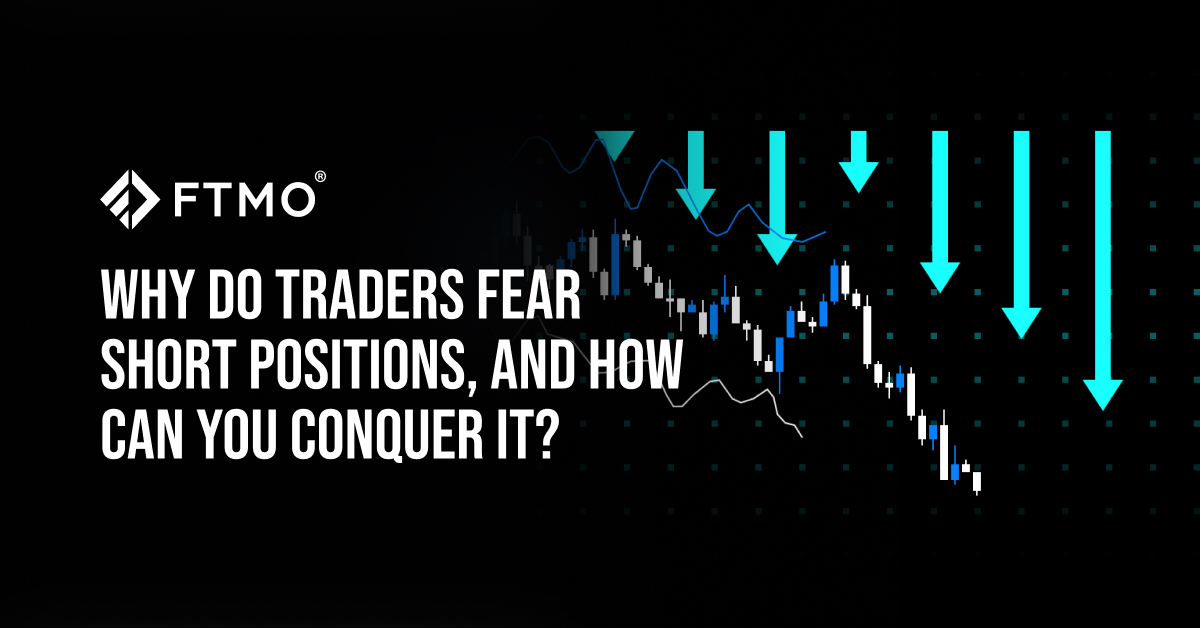
Why do traders fear short positions, and how can you conquer it?
Recently, in our series on successful traders, we wrote about a trader who only opened long positions on his FTMO Account. In today's article, we will look at why some traders open only long positions and how to deal with this problem.
Our trader managed to achieve a very interesting return despite opening only long positions, so it was probably not a big problem in the case of the account in question, but in the long run he may be missing out on a lot of good opportunities by choosing this approach.
But this trader is not an exception, there are quite a few of them among traders, especially those starting out or those who have experience with traditional investing. The reasons for this aversion may vary, but in most cases it is simply that speculating on a price decline is unnatural for these traders.
The power of habit
When it comes to investing in stocks, for example, shorting still comes with a few problems. Apart from the fact that some people consider such speculation immoral, in most markets shorting comes with additional fees, or some titles cannot be shorted at all. These are, in short, practical reasons where one can understand that traders are not used to opening short positions, but at the same time, in such cases, traders (who have switched from investing to trading) first learn that shorting is not a bad thing.
It's in the head
But then there are reasons that are no longer based on technical issues, but rather have a psychological basis. For example, investors are used to the idea that a stock going up intermittently is something that indicates a functioning economy (or a successful company) and a move down is simply something bad that they don't want to experience. They have experienced long-term growth trends, so they don't even want to bet their money on a downturn. So they subconsciously avoid stocks or other instruments that they think are inferior and don't want to trade them. They simply want to believe that the price will rise because it is the right thing to do (optimism bias).
Fear of loss
Another reason behind this is once again the psyche of traders, the fear of losses. Traders perceive losses much more sensitively and take them much harder than profits. The negative feelings of losses are much stronger than the joy of profits. Moreover, we can read everywhere that in a long position the theoretical loss is only what we invest (because the minimum is zero), but in short positions the loss can be unlimited because the price can rise indefinitely. The combination of fear of loss and unlimited loss then leads to a reluctance to open short positions.
Also interesting is the notion that when a trader looks at a chart and sees green and red candles, the red simply evokes something negative (or stop as in traffic lights) and vice versa and the green is positive, which again evokes a reluctance to speculate on the downside. Or when traders talk about setting a Stop Loss or Take Profit, they automatically talk about SL down, below price and TP up, because they automatically take the price rise as something positive.
How to handle shorts?
No matter the reasons for disliking shorting, avoiding it in trading can be detrimental and should be addressed promptly. In leveraged trading, which is primarily suited for short-term strategies, long-term trends hold less significance. Limiting yourself to only long positions becomes unnecessary. Leverage inherently balances the risk and profit potential for positions in both directions. In the forex market, where trading involves speculating on the rise of one currency and the fall of another within the same trade, the concept of "classic shorting" doesn’t fully apply.
When a trader has a problem with the fear of losses, he does not have to solve it by opening only long positions, but can rather open smaller positions. For example, the solution may be to open larger positions for long positions, but to open short positions at half the size to make him feel more comfortable.
Here at FTMO, we advise all traders not to open positions that are too large, no matter if they are short or long. Unnecessary risk does not work either way.
Good risk management and money management is essential for any trader, but for those learning to short, this is doubly true. It is equally true that when they decide to modify their strategy and add the option to short positions, they must have sufficiently tested the strategy. For short positions, they can then set up more rules that will confirm the entry. Again here, this can help them feel comfortable and gradually get used to speculating on the downside.
Conclusion
Avoiding short positions in markets like forex makes little sense, as it needlessly limits traders from accessing numerous potentially profitable opportunities. While the case for short positions may be less straightforward in CFDs on commodities, indices, stocks, or cryptocurrencies, the simplicity and potential benefits of shorting make avoiding it both unnecessary and logically unfounded, even for these instruments. If you have a problem with opening short positions, try consulting our performance coaches or check out our Trading Psychology course. Trade safely.
About FTMO
FTMO developed a 2-step Evaluation Process to find trading talents. Upon successful completion you can get an FTMO Account with a balance of up to $200,000. How does it work?.










